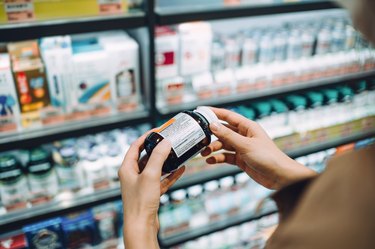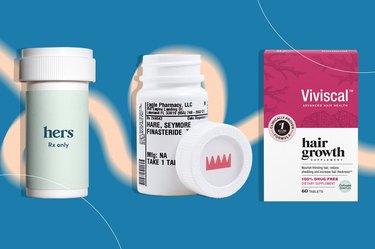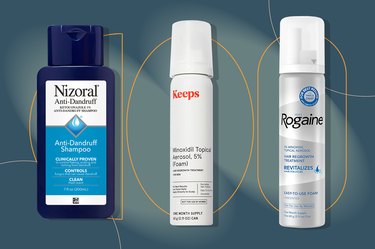
Biotin is advertised as a great supplement for growing your hair and nails and keeping skin smooth. That's why many people purchase biotin (a major B vitamin that plays a role in metabolism) over the counter at pharmacies and grocery stores.
But how much biotin is too much? And are some biotin supplement dosages — like 10,000 or 20,000 micrograms — too much for your body?
Video of the Day
Video of the Day
Here, learn the benefits and side effects of taking biotin along with the proper amount to take.
Warning
Always talk to your doctor before trying any new supplement or vitamin. If you are taking biotin supplements or any other over-the-counter supplements, make sure to mention them to your doctor.
What Are the Benefits of Biotin?
Biotin (also known as d-biotin or vitamin B7) plays an essential role in regulating your metabolism and helping your brain transmit nerve signals. It's part of the larger vitamin B family that helps support your brain and nervous system.
Typically, biotin pills are advertised to help strengthen and grow your hair and nails, especially if you experience breakage, per the Cleveland Clinic. The nutrient is also supposed to give your hair a shinier appearance and help skin appear smooth and hydrated.
Biotin's really only going to help, though, if you have a true biotin deficiency. In otherwise healthy people, supplemental biotin likely has little effect, and it can't completely cure conditions like skin rashes or hair loss, per the Cleveland Clinic.
So if you're experiencing brittle hair and nails, you would have to see a doctor to find out the underlying cause and determine whether biotin supplements might help.
Can You Have a Biotin Deficiency?
While biotin deficiency is rare, some common signs include thinning hair all over the body, brittle nails and a scaly, red rash around the eyes, nose and mouth. In severe cases, it can cause depression, lethargy, hallucinations and numbness or tingling in the arms and legs, per Mount Sinai.
Food Sources of Biotin
You don't necessarily have to take biotin supplements to experience the nutrient's benefits. In fact, most people get their recommended daily amount (RDA) of biotin per day through food alone.
Some common foods high in biotin include the following, per the NIH:
- Beef liver
- Beef
- Eggs
- Salmon
- Tuna
- Sunflower seeds
- Almonds
- Sweet potatoes
- Spinach
- Broccoli
How Much Biotin Can You Take Per Day?
For most adults, the adequate intake (AI) of biotin is 30 micrograms per day, according to the National Institutes of Health (NIH). People who are breastfeeding may need slightly more — about 35 micrograms per day.
Biotin is widely available as a nutritional supplement in varying strengths. Doses range from about 10 micrograms up to 5,000, 10,000 and even 15,000 micrograms or more. This amount, however, is well above the AI to meet the needs of most adults.
Is 10,000 Micrograms of Biotin Too Much?
Supplements with 10,000 micrograms of biotin provide 33,333 percent of your AI, per the NIH. While this may seem excessive, there have been no reports of toxicity from this amount of biotin.
B vitamins like biotin are water-soluble, which means they don't build up in your body — whatever you don't use, you excrete via your urine.
But what about 20,000 micrograms of biotin? This amount is also considered safe. Keep in mind, though, that too much biotin in your system can cause one adverse effect: messing with your lab test results (more on that below).
Biotin Side Effects
Biotin has not been linked to any side effects, even in high doses, and it's not really possible to take too much biotin because it's water-soluble, which means any excess passes through your urine.
That said, it is possible for high levels of biotin in your body to cause some of your lab and blood test results to appear abnormal, resulting in falsely high or falsely low results, according to the FDA.
Many lab tests — such as thyroid hormone tests and those that look for heart conditions — use biotin because it bonds with proteins that, when measured, can reveal certain health problems. In particular, biotin can cause a falsely low result for troponin — a chemical biomarker that aids the diagnosis of heart attack, per the FDA.
If you've taken too much biotin, doctors and lab technicians may read your lab results and miss or misdiagnose a serious condition. You may not get the proper treatment you need, or a condition may go undetected.
And with conditions like heart attack, it is extremely important to receive proper care.
Is Biotin Safe for Your Kidneys?
There is not enough evidence to support a connection between biotin and kidney problems. But one August 2020 case study in Clinical Kidney Journal did find that people with end-stage renal disease may receive abnormal endocrine function tests if they take biotin.
The study followed a 58-year-old person with end-stage renal disease who took 10 milligrams (10,000 micrograms) of biotin per day. Even a week after stopping biotin, there were still high enough levels in their system to cause abnormal lab results.
Does Biotin Cause Weight Gain?
There is no evidence to suggest that biotin can cause weight gain. While some people claim that biotin has caused them to gain or lose weight, these are anecdotal findings.
More research is needed in order to determine if there's a connection between biotin and weight gain.
So, How Much Biotin Is Too Much?
Technically, anything above the AI of 30 micrograms of biotin per day is too much for the average healthy adult. While it won't hurt to take more, it's not really necessary.
With that said, some people may be prescribed a high-dose biotin supplement by their doctor to treat a biotin deficiency or to help manage a certain condition, such as multiple sclerosis, per a May 2022 review in Neurology.
But there isn't enough evidence to show biotin will help improve hair, skin and nail health unless you have a true deficiency, per the NIH.
On top of all that, taking too much biotin can alter important lab test results, which could cause doctors to miss or misdiagnose serious conditions like heart attacks.
When to See a Doctor
If you do feel that your hair loss, brittle nails or skin rashes are persistent and excessive, talk to your doctor about getting bloodwork done to see if you have any vitamin deficiencies. In this case, they may recommend biotin or another vitamin.
Always tell your doctor if you're taking biotin or any other vitamin prior to getting lab tests, so they can ensure you receive accurate results. They may even ask you to stop taking biotin weeks prior to your tests to ensure the best possible results.
FAQ
1. How Often Should You Take 10,000 Micrograms of Biotin?
If your doctor gives you the OK to take biotin supplements, ask what the proper dosage will be for you and your needs.
The exact number of biotin doses you take each day will depend on the particular supplement you're using and your specific condition. Always follow the directions on the product's label or your doctor's instructions, per the Mayo Clinic.
2. Should I Take 5,000 Micrograms or 10,000 Micrograms of Biotin?
As mentioned, the adequate intake (AI) of biotin for most healthy adults is 30 micrograms. Anything above that is not necessarily going to be used by your body unless you have a true biotin deficiency. In that case, your doctor will recommend the appropriate dosage for you.
3. What Is Better for Thinning Hair: Biotin or Collagen?
Both collagen and biotin have been advertised to help thinning hair. But it's undetermined whether collagen supplements that are supposed to help hair, skin and nails actually do so. And there is not enough evidence to support that biotin supplements do so either, per the Mayo Clinic.
- National Institutes of Health: Biotin
- Food and Drug Administration: The FDA Warns That Biotin May Interfere With Lab Tests
- FDA :"FDA reminds patients, health care professionals and laboratory personnel about the potential for biotin interference with certain test results, especially specific tests to aid in heart attack diagnoses"
- Clinical Kidney Journal: "Biotin supplement interference with immunoassays for parathyroid hormone and 25-hydroxyvitamin D in a patient with metabolic bone disease on maintenance hemodialysis"
- Neurology: "High-dose biotin for Multiple Sclerosis: A Systematic Review and Meta-Analyses of Randomized Controlled Trials"
- Mayo Clinic: "Biotin (Oral Route)"
- Mayo Clinic: "Mayo Clinic Q and A: Collagen and biotin supplements"
- Mount Sinai: "Vitamin H (Biotin) Information"
- American Association for Clinical Chemistry: "The Unintended Consequences of Biotin Supplementation: Spurious Immunoassay Results Lead to Misdiagnoses"


